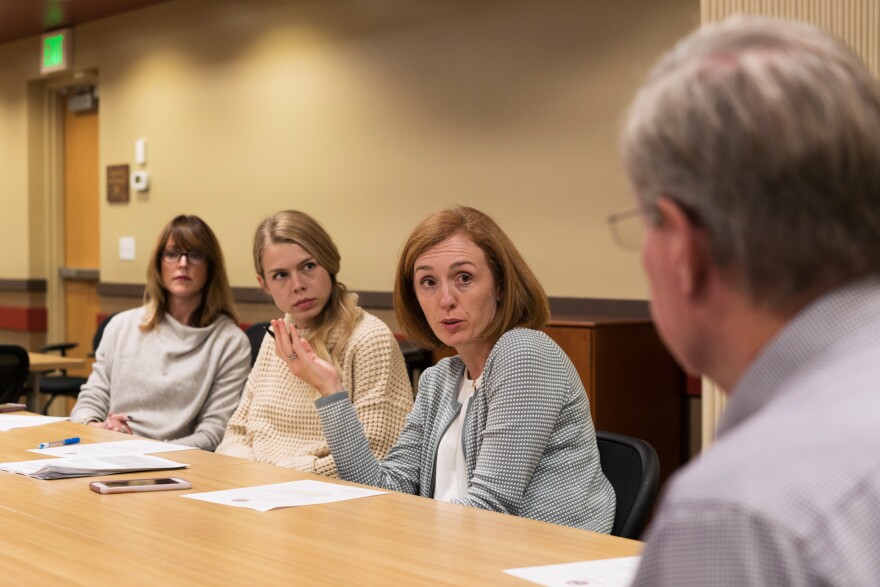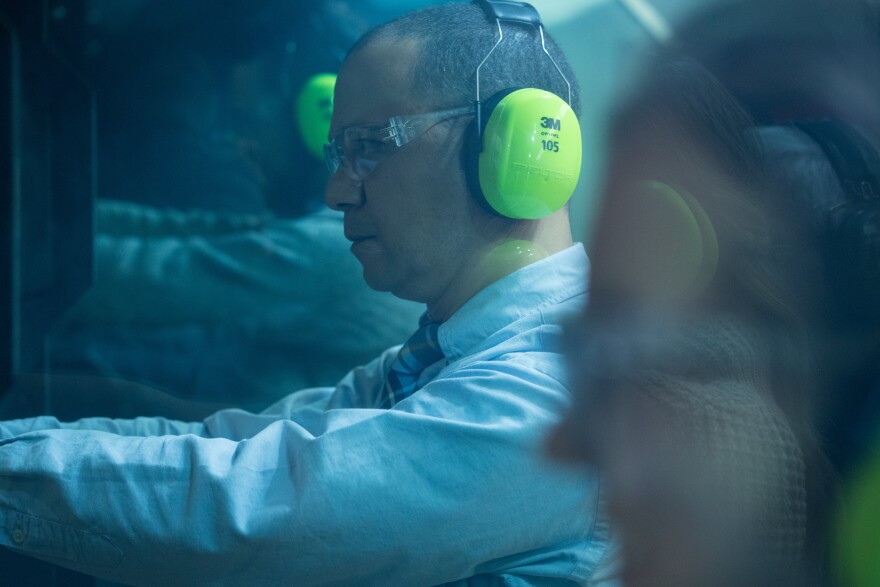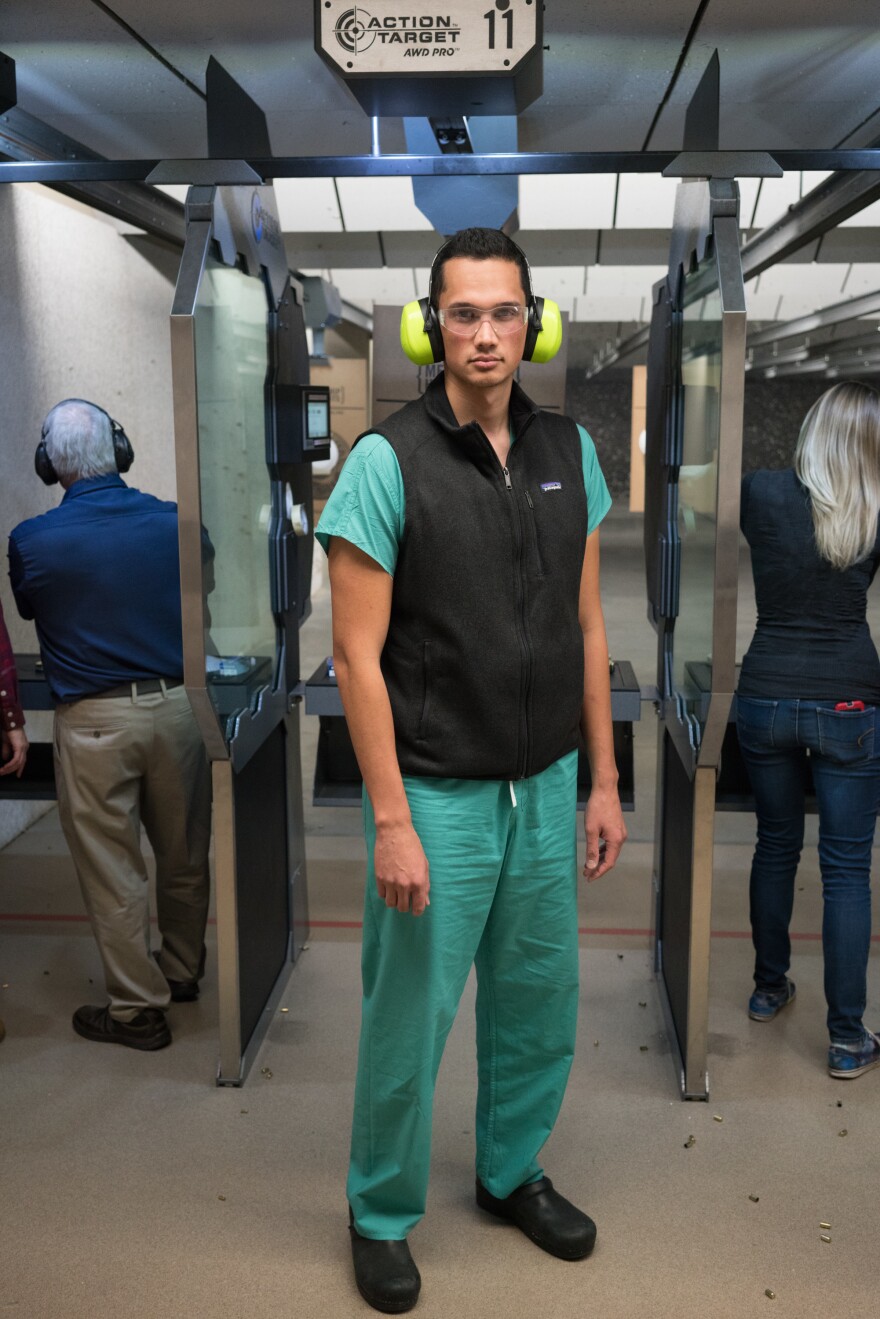Doctors across the U.S. have become increasingly vocal in addressing gun violence as a public health crisis, a posture that recently has drawn the wrath of the National Rifle Association.
Yet, in Colorado, a diverse group that includes doctors, public health researchers and gun shop owners has come together to bridge this divide. The Colorado Firearm Safety Coalition has found common ground on at least one issue: preventing firearm suicide.
The group's motto: "fighting suicide, together."
One member of the coalition — Michael Victoroff — has a foot in both worlds. He's a competitive shooter, an NRA-certified firearms instructor and a retired family physician who lives in Centennial, Colo.
When Victoroff thinks about suicide prevention, one patient in particular comes to mind: a young woman who shot and killed herself decades ago, when he first started practicing medicine.

"I never saw that coming. I didn't have the slightest clue," Victoroff says. "I didn't know she owned a gun. Now, this week if I were talking to her I would say, 'Do you have a gun in the house? Do you have access to a gun? Does this figure into any of your plans? And, if so, I'd really like to talk to you about changing plans.' "
Victoroff is a co-founder of the Colorado coalition, along with Dr. Emmy Betz, an emergency room physician and public health researcher at the University of Colorado School of Medicine, who focuses on suicide prevention.
Betz has been affected by gun suicides in her own family, including one just recently — a cousin in his 20s.
"That's still pretty raw for many of us," Betz says. "For me, happening in the midst of the work that I do, it made me pause and think about, 'Do I want to keep doing this work? And how could I have not done more to prevent it?' "
According to Betz, it hasn't been hard within the coalition to find common ground on suicide prevention. "Shame on us in public health for not doing this sooner," she says.
When Betz and Victoroff started the group in 2015, they knew they wanted to include gun dealers, as well as people who work in health care.
The gun retailers "were astounded by the suicide statistics," Betz says.
Those numbers are stark.
Colorado has one of the highest suicide rates in the U.S., and half of the state's suicides are carried out with a firearm.
What's more, if you look at all firearm deaths in Colorado, nearly 80 percent of them are suicides.
"If you want to reduce suicide deaths, you have to talk about firearms," Betz says. "And if you want to reduce firearm deaths, you have to talk about suicide. They are so linked in this country. And when we talk with patients, it should not be about Second Amendment rights. It should not be about politics.That has no place in the exam room. This should really be about home safety."
Guns are by far the most lethal means of suicide, and physicians need to know that, Betz says.

"Eighty-five to 90 percent of people who attempt with a gun will die, because that's what guns are supposed to do, is be lethal," Betz says. "So if I had to pick one thing to get out of the house or to lock up, it would be the firearms."
Betz also wants doctors to know there are no restrictions in asking patients about guns; despite a common misconception, there is no "gag rule." A Florida law known as "Docs vs. Glocks," which prohibited doctors from asking about gun ownership, was struck down by a federal appeals court as unconstitutional.
In having what can be sensitive conversations with patients, doctors need to be "culturally competent" about guns, Victoroff says.
"Very often, when docs want to give information or want to help somebody with firearm safety, they embarrass themselves by being clearly unfamiliar with the subject matter," he says. "They don't understand guns. And that totally wrecks their credibility with gun owners."

The result, Victoroff says, is "you lose your ability to intervene therapeutically because you're off the point. You don't sound believable."
To help physicians build that "cultural competency," the Colorado coalition offers occasional training for doctors and medical students to familiarize them with firearms. Sometimes they take these health workers to a gun range for target practice.
The coalition is also part of a nationwide effort to raise suicide awareness among gun retailers and their customers.
Some retailers have resisted, seeing these efforts as a form of gun control in disguise. But many others have signed on.

The coalition provides gun stores with pamphlets on suicide prevention that encourage people to lock up their guns or temporarily give them to a friend or relative if they're going through a rough time.
Stacks of those pamphlets are on display at the Bristlecone Shooting, Training & Retail Center in the Denver suburb of Lakewood.
"We love everything about firearms and the firearms industry, but we also realize very seriously that there is a negative side to it," says Bristlecone co-owner Jacquelyn Clark, one of the founding members of the Firearm Safety Coalition.
That "negative side" became horribly clear at Bristlecone two years ago.
A first-time customer came in by himself and rented a gun. He went out onto the range, fired off half a box of ammunition, and then shot himself in the head, right there.
That suicide was devastating, Clark says: "We felt like we, more than any other range in town, had been taking steps already to prevent it. We were already part of the coalition, and it happened anyway. It was an eye-opening experience. And so we doubled down our efforts, to not have it happen again."
Bristlecone now has what it calls a "suicide prevention policy."
They won't rent a firearm to any first-time customers who come to the range alone, unless a friend or relative can vouch by phone for the would-be customer's "healthy mental state."
Staff are also trained, Clark says, to be on the lookout for customers exhibiting signs of mental distress: "Can't answer questions. In a hurry. Not engaging. They just want to make the purchase and get out."

Bristlecone salesman and firearms instructor Steve MacGregor recalls one customer who came in looking to buy a gun: "His lip was quivering, he was looking down a lot at the floor, making no eye contact."
MacGregor says the man told him his wife had just filed for divorce.
"We said, 'You know, this just isn't a good time. I can see a lot of emotion on your face. I think you really should take some time and just cool off,' " MacGregor says. "He thanked us for the way we reacted to him, and he left. And I have seen him come back in here."
Clark, the shop's owner, says if the store's policies do keep some customers away, "that's the cost of doing business in the way that we want to do business that we accept."
Despite finding common ground on suicide prevention, the coalition members know they're not likely to bridge their differences on more contentious territory.
They don't try to come to agreement on an assault weapons ban, for example, or on limits to magazine capacity.
And there's still a strong cultural divide within the coalition on how members view guns, and the question of whether firearms make us safer.
Take Michael Victoroff, the firearms instructor and retired physician.
"Certainly I'm in that group that enjoys [guns]," he says. "For me they're a hobby; they're amusing; they're interesting. And I would be resentful — in fact, I'd feel it was an injustice — if someone said, 'Look, it would just be better if you gave 'em all up.'"
Contrast that with the view of his coalition co-founder, Emmy Betz, who says, "I would feel safer in this country if we didn't have guns. Personally, I still don't feel comfortable going into gun stores, and I don't like going to the range."
But, she adds emphatically, "I am not trying to actively repeal the Second Amendment. I am not trying to take people's guns away."

One of the youngest members of the Coalition, 25-year-old Will Dewispelaere, is wrestling with his own internal conflict.
"I'm kind of a self-hating gun owner," he admits, half-joking.
Dewispelaere owns a rifle and a pistol for target shooting. He's a third-year medical student who has seen the toll of gun violence up close.
One recent night on his surgical rotation, he saw three gunshot victims. Two were dead on arrival.
Putting a face, in that way, to the issue of gun violence, and seeing the horrific physical damage bullets cause, has made Dewispelaere think seriously about giving up his guns.
"I can go to the range and say, 'Wow, that's a lot of fun, and I really enjoyed shooting,' " he says. "And then I can go to work the next day and I can see people that are gunshot victims. It feels like two different worlds. And here I am in the middle of those two worlds, trying to reconcile how I feel about it."
As for the NRA's recent admonition to doctors to "stay in your lane," and not speak out on gun violence?
Dewispelaere rejects that. "Gun violence is such a complicated issue," he says. "If you start putting people in lanes, you've already lost."
Copyright 2021 NPR. To see more, visit https://www.npr.org. 9(MDAxODc1NzUzMDEyMTgyMjc0NzUxZmVhMQ004))




